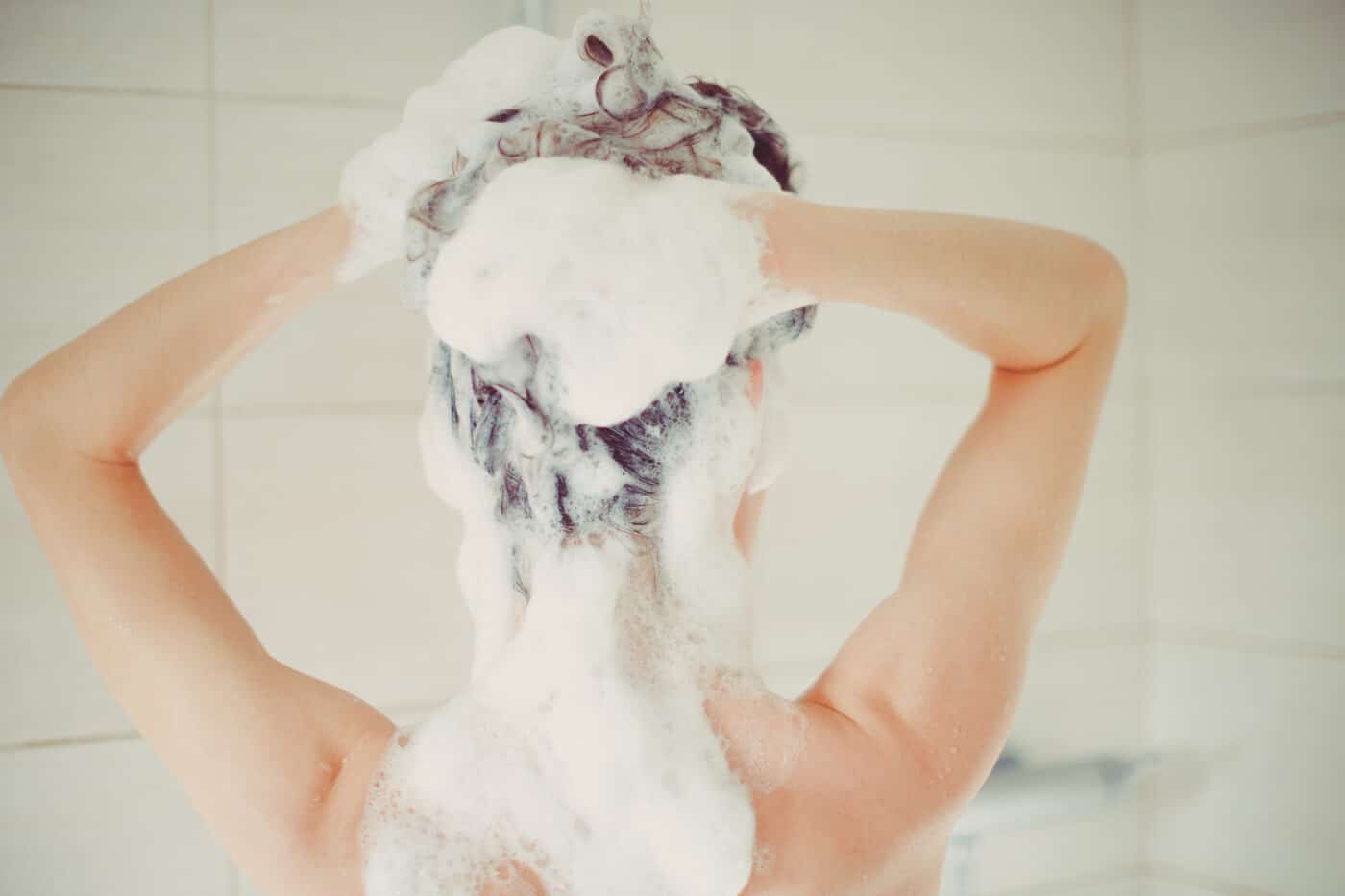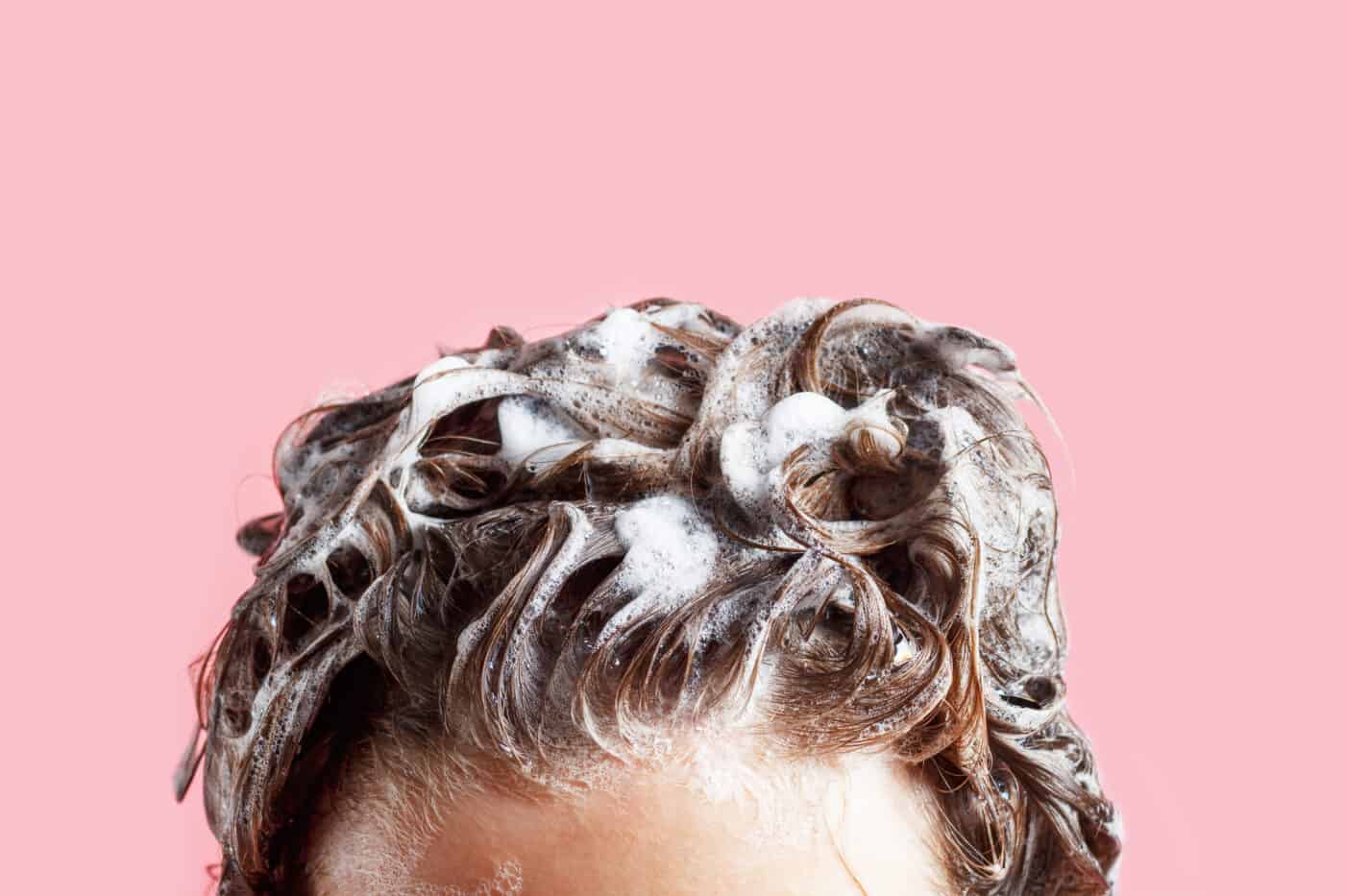If you are one of the 85% of Americans being affected by hard water areas, it’s important you know to wash your hair appropriately. In this article, we’ll explain what hard water is, the issues it can cause, and provide you with an easy guide on how to wash hair in hard water.

Effects of Hard Water on Hair
Hard water contains mineral deposits, and these deposits can make it nearly impossible to rinse your hair thoroughly and successfully.
This can attribute to build-up on the hair follicles and residue being left behind in your hair which can then lead to scalp irritation and possible infection.
These are the signs to look out for if you’re concerned about hard water:
- Your hair feels delicate and flimsy
- Your hair appears dull
- You find residue in your hair
- Your hair is difficult to lather with shampoo
- You may experience thinning or breakage of your hair, or, worse case, hair loss
If you notice you are experiencing any of the above signs, it’s not a cause for concern.
There are certain steps you can take to ensure the safety and longevity of your hair and ways to keep it looking shiny.
How to Wash Hair in Hard Water

There are many methods for taking care of your hair when you have a hard water problem. Some methods are effective, some not so much.
Let’s go over a few of the most effective treatments:
1. Water Softening Equipment
The most obvious choice would be to purchase and install a water softener.
This equipment is usually placed somewhere near the main water supply and works by eliminating high concentrations of magnesium and calcium which are the main causes of hard water.
The end results? Your water is softened and is safer to use. You can install one yourself or consult a professional plumber for assistance.
Water softeners and their installation (if you choose to go with a professional) can be costly, so another water softening mechanism to try is a shower head water filter.
While they may not be quite as effective as water softeners, they’re easy to install and help to reduce minerals and chlorine found in your water, allowing you to take a healthier shower.
2. Use Distilled or Purified Water
Another popular choice to help fight against the effects of hard water on your hair is to use distilled or purified water as a final rinse before leaving the shower.
You can purchase distilled water from any convenience store, drug mart, or gas station, in bottles or in jugs.
Alternatively, you can skip the trip to your local store and try distilling the water yourself. It’s a pretty simple and straightforward process that almost anyone can do.
Rinse with Vinegar
Vinegar has a lot of benefits to the body.
It should therefore come as no surprise to know that rinsing your hair with vinegar is beneficial and can help in eliminating the buildup left behind on your scalp from hard water.
It’s recommended to use apple cider vinegar as it has the most benefits in fighting against hard water residue and buildup but you can also use any vinegar of your choosing.
What You’ll Need
- Vinegar (preferably apple cider)
- Water
Instructions
- Add 1 part vinegar to 2 parts water
- Shampoo and condition your hair as normal
- Once you have rinsed the shampoo and conditioner out, pour the vinegar mixture onto your hair
- Take extra time to massage your scalp thoroughly
- Allow it to sit for 5 minutes or more
- Rinse your hair out
While this is an effective method of eliminating residue, it should not be used too frequently as it can cause its own adverse effects such as dry hair.
Rinse with vinegar once a week for the best results.
Rinse with Citrus
Similar to the vinegar rinsing method, rinsing with citric acid can also be an effective way of reducing the results of hard water on your hair.
What You’ll Need
- Fresh lemon juice and/or lime juice (you can use both or just one)
- Water
Instructions
- Mix the fresh lemon and/or lime juice with 3 parts water
- Shampoo and condition your hair as normal
- Rinse shampoo and conditioner out
- Pour citric acid mixture through your hair
- Massage the mixture thoroughly through your hair and scalp, taking extra time on the latter
- Rinse to finish
Not only is this mixture beneficial for fighting against the effects of hard water, but it also helps with dandruff and will restore shine and silkiness to your hair, leaving you with lush, lavish locks.
Clarifying Shampoos
There are specific types of shampoos on the market that can help in eliminating gunk, residue, and buildup from, not just hair products, but also hard water.
These shampoo types can range in price and with such a variety to choose from, you’re sure to find one that you’ll love.
Again, it’s recommended to just wash your hair with a clarifying shampoo once a week. It will help in removing any deposits left behind on your scalp and will also help your hair to shine.
Leave-in Conditioner
While leave-in conditioner won’t help in stopping or preventing the residue hard water leaves behind,
it can help prevent dry hair and breakage that occur from hard water.
Leave-in conditioners can be used once or twice a week and they are especially helpful if they contain ingredients such as almond oil, argan oil, coconut oil, or jojoba oil.
Moisturizing Hair Mask
This convenient and easy-to-use method requires only a moisturizing hair mask.
These masks are created with nourishing ingredients such as oils and butters and are more effective at nurturing your hair than even shampoo and conditioner.
Using them takes around 20 minutes and afterward, you will find your hair to be less dry and frizzy, leaving you with shiny and healthy-looking hair.
Anode Rod
You’re probably wondering what an anode rod is.
Well, powdered anode rods help in eliminating bacteria in your water supply.
They also help to protect the pipes from hard water which, in turn, gives protection to your hair when taking a shower or bath.
It’s best to consult a professional to install such a device, though, as the installation can be quite difficult.
In Conclusion

Hair can tell a person a lot about their health and hygiene and it’s important to take the best possible care of it to ensure that your hair, and you, are staying happy and healthy.
This means that it is important to know how to wash your hair effectively, especially if you’re living in a home plagued by hard water.
In this article, we have gone over several ways of fighting against the effects that hard water has on the hair and scalp.
You should now have a pretty good understanding of the best remedies to treat hard water effects as well as have the answer to some very important questions including how to wash hair in hard water.
Happy washing!
Frequently asked questions (FAQ)
There are a few ways of telling if your home is affected by hard water. If your hair feels stiff and dry, looks dull and dingy, or if you notice your hair’s color fading, then it’s possible that you have hard water.
In severe cases, yes. Hard water can cause your scalp to become irritated which can end up leading to significant hair loss.
Fortunately, permanent damage does not result from hard water. Even hair loss associated with had water can be repaired once you find a solution to your hard water problems.
For the best solution, we recommend washing your hair with soft water which will help in eliminating the residue left behind by hard water. Of course, eliminating the hard water issue altogether is the most optimal solution.
Disclaimer: This site is not intended to provide professional or medical advice. All of the content on LovedByCurls.com is for informational purposes only. All advice should be followed at your own discretion. Ingredients may change at any time so always check the product label before using. Check our full disclaimer policy here.
